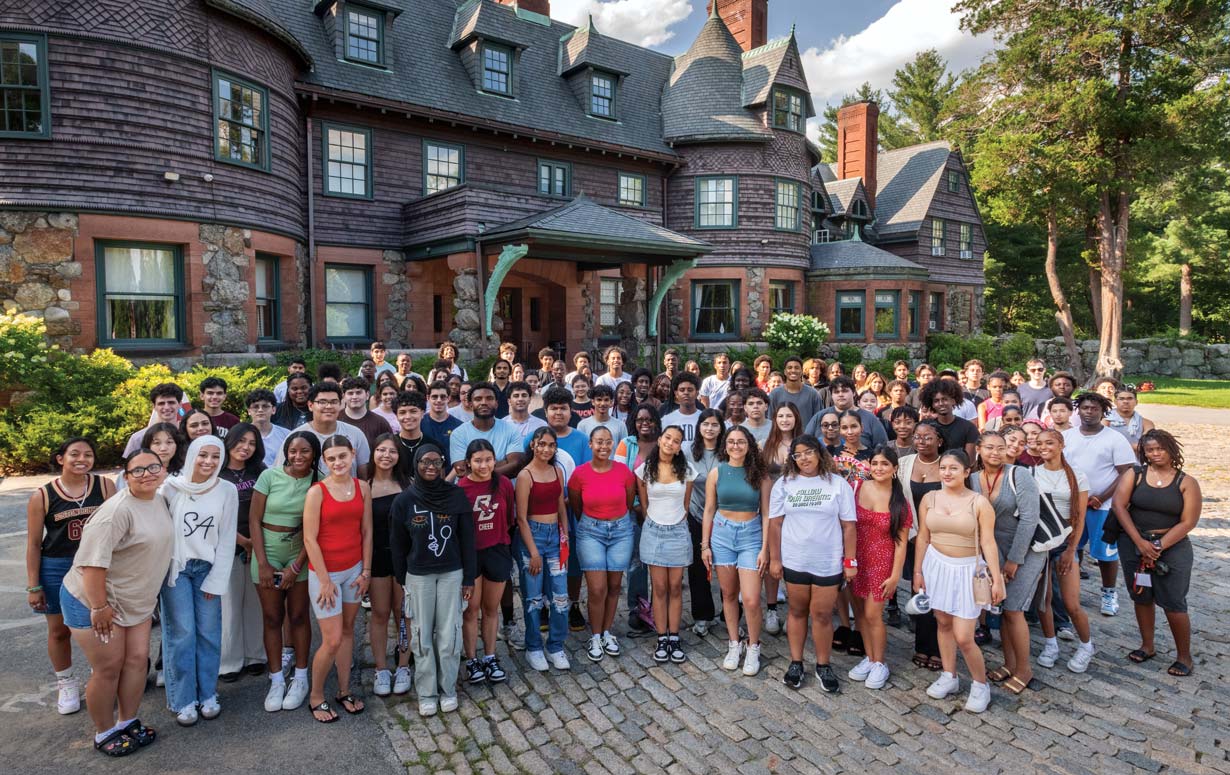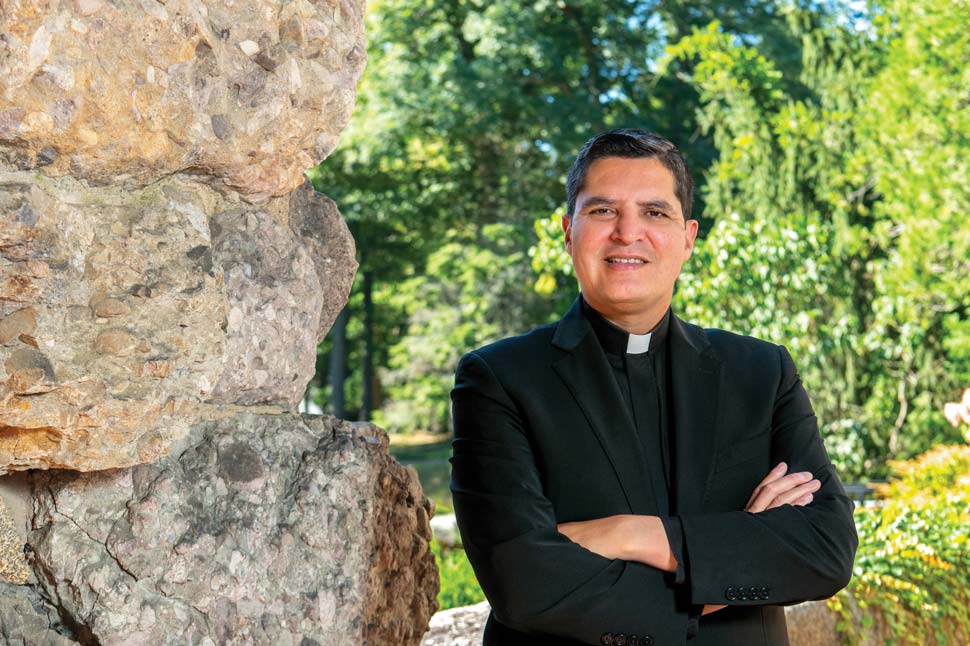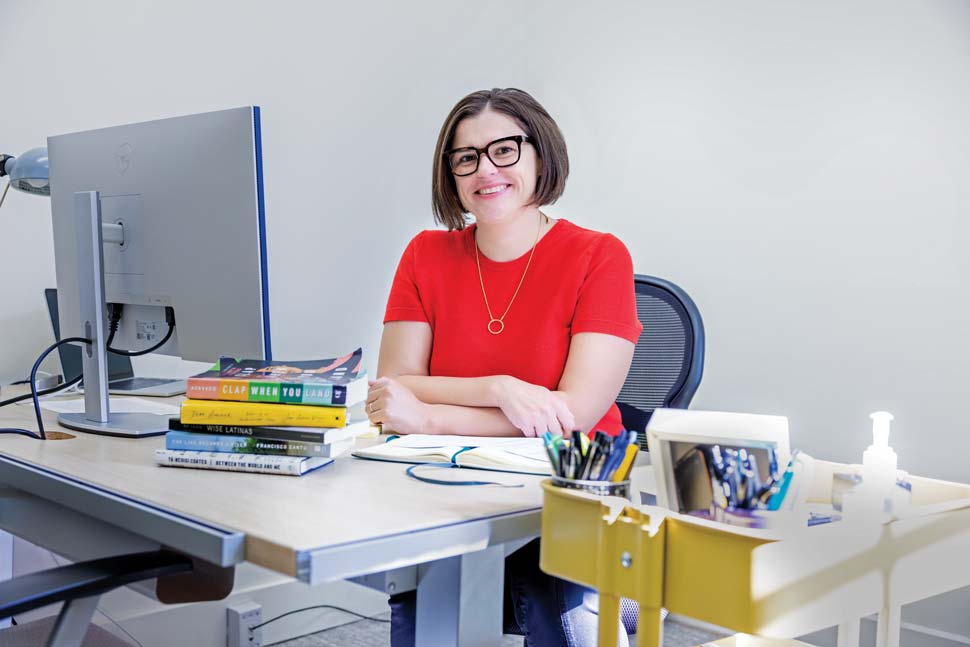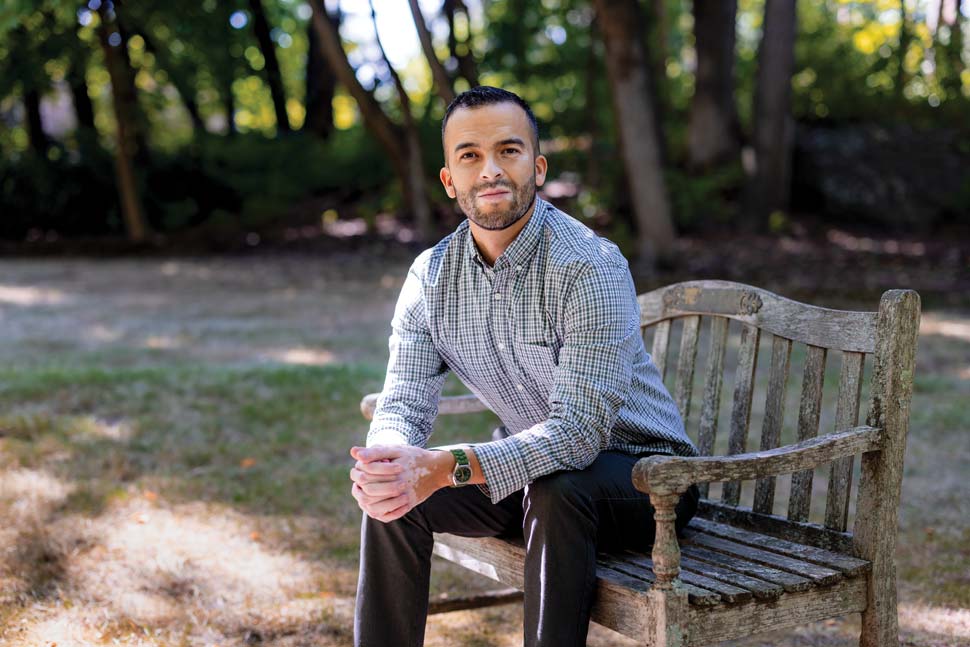The Touchdown Maker
Pete Carmichael Jr. ’94 may have starred on the baseball diamond for the Eagles, but the NFL is where he’s built his reputation as a brilliant offensive coach.

Photo: Lee Pellegrini
Introducing Messina College
BC has launched a new two-year residential junior college for first-generation students from low-income families.
It was the middle of July, and with the mercury rising into the mid-nineties, the Boston College campus was mostly dormant. In six weeks’ time, the Heights would be bustling with activity as a new school year commenced, but for now, summer’s languorous days had cast a spell of tranquility over BC.
But only a mile to the south, on the Brookline Campus that was once home to Pine Manor College, the buzz of a new school year had already enveloped the grounds of Messina College, the brand-new two-year, residential junior college that BC has launched this academic year for promising first-generation college students who come from low-income families. Messina College is a bold idea not just for BC but for higher education in general, one of the very few degree-granting junior colleges in the country to be operated by an elite university, let alone one specifically concerned with educating people who are the first in their family to attend college.
The Messina campus still looks and feels a bit like the residential estate it once was. Originally the home of a successful Boston businessman, the fifty-acre property features a renovated brick-and-stone carriage house that today serves as a science building complete with a natural science lab and a fully renovated STEM lab. The college’s Administration Building, meanwhile, is a converted nineteenth-century Shingle-style mansion that’s perched atop the property’s highest point. If a new two-year institution situated in such a bucolic setting and focused on students from under-resourced communities sounds like a bit of an experiment, that’s because it is. The staff involved in the school’s creation and its day-to-day operation are taking a new approach to investing in the success of their students. Messina College students receive a scholarship for their full demonstrated financial need, and any student who earns an associate’s degree with a cumulative GPA of at least 3.4 can enroll at BC to finish their undergraduate studies and earn a bachelor’s degree.
Messina College was designed to help students make the most of these opportunities. The school’s founding dean, Erick Berrelleza, SJ, was himself a first-generation college student, as were many of Messina’s faculty members. The college offers a mentorship program that connects students with Boston College juniors and seniors, plus tutoring sessions and the mandatory Summer Start session that was the source of the campus buzz in July and August. During the session, the college’s inaugural class of 110 students completed two of their core curriculum courses. It was an opportunity to transition to a residential college setting and to ease into the challenging course work. In the Administration Building, for instance, incoming freshmen explored the form and efficacy of the personal essay during meetings with Professor Kat Gonso. A short distance away in the Ashby Center—a mixed-use building composed of classrooms, a dining hall, gathering spaces, and a chapel—other students met informally in small groups to study together and talk through assignments for classes such as life science chemistry, first-year writing, and a first-year discovery seminar.
The Summer Start initiative was designed to help students adjust to residential college life, and it’s part of the school’s strategy of investing in the academic success of ambitious and determined learners who don’t have family members to help them with the transition to higher education. “It gives them a better on-ramp to college life,” Fr. Berrelleza said, adding that the summer session exemplifies the vision he articulated more than two years ago when he accepted his position as the school’s founding dean. “My goal,” he said at the time, “is to create a place that students will feel comfortable in, a place where they know we have their best interests at heart.”
With summer having now turned to fall, and Messina in the middle of the first academic semester in its history, Fr. Berrelleza’s faith in that vision has been rewarded. But getting the school launched was simply a first step. “We’re a startup, in a sense,” he said. “We’re going to be learning with these students and figuring out what they need to be successful. We have a model, but the model can be adjusted. We want to maintain that spirit that we can be nimble, that we can change, that we can pivot if we need to.”

Erick Berrelleza, SJ, Messina College’s founding dean, is himself a first-generation college student.
Messina college freshman Ashlynn Edwards, who is pursuing a degree in psychology and human development, spent much of her childhood alternating between her parents’ custody and the foster care system, all while bouncing from one town to the next across the South Shore of Massachusetts. Edwards eventually ended up living with family in Weymouth. She was grateful, but the house never felt like it was her own space. “One thing I didn’t have so much at home was routine or structure,” she said. “Rather, I was trying to force a routine or structure on my house.”
It makes sense, then, that the importance of having a sanctuary space was the topic of Edwards’s Messina application essay. “At a young age, I ended up getting a job so I could buy myself a used car and have a place to get away, to breathe and do my own thing,” she said. “My car was my sanctuary, and I’m realizing that that’s also what college can be for me. Just in the way that a car is not just a piece of transportation, college is not just a degree. It’s so much more.” Curled up in an armchair in an Administration Building sitting area, Edwards said that, just a few weeks in, the college campus already felt like that sanctuary she’d been looking for.
Like Edwards, most of Messina’s students come from Massachusetts. More than half of the inaugural class, which is 56 percent male and 44 percent female, attended Boston high schools, and the college also recruited heavily in cities such as Worcester, Springfield, Brockton, Lowell, Lawrence, and Providence, Rhode Island.
Freshman David Castillo-Parahoy, who is studying applied data science, said he was thrilled by the academic opportunities he’d found at Messina. “Just coming in and seeing how everybody in this environment loves to learn, loves to study, and wants to do better for themselves…” he said. “I had no idea it was going to be this way.” Castillo-Parahoy, whose parents immigrated to the United States from the Dominican Republic, described himself as “obsessed” with academics in high school—he tutored middle school students in his home city of Lawrence—but said he didn’t always feel that he had time to dedicate to his studies. All of that has changed at Messina, he said. “We’ve all realized how much autonomy we really have now as college students,” he said. “We have more freedom and we have more responsibility. Everybody that I’ve met so far has this mindset to do better for themselves and for their community, and everybody feels like we all can relate and connect in that way.”
Castillo-Parahoy is precisely the kind of student that Messina College hopes to attract—talented young adults who have the aptitude and resolve to thrive but who haven’t had the benefit of school initiatives or resources to realize what they’re capable of. Messina’s goal is to help these students unlock their potential. “The atmosphere here is so warm and welcoming, and the assignments we’ve been given so far have been personal,” said freshman Darius Dowdye, who is from Boston. Dowdye learned about the college when a Messina recruiter visited his high school. He’s now the first member of his family not just to attend college but also to graduate high school. One of his first writing assignments at Messina required him to reflect on his goals and what he wanted from himself. “I got deep in mine, and I thought it was going to be embarrassing to share that in the classroom,” he said. “But then everyone was talking about something that really mattered to them. That’s when I was like, ‘Oh, this is what it’s gonna be like!’ Being around people that are pushing themselves and constantly working to be better, and are pushing you to do that…it’s contagious.”
“These students have incredible potential,” Fr. Berrelleza said, “and this program is designed to center that experience, helping them build the framework that is going to help them achieve their academic goals. These students have what it takes. They just need assistance.”
Messina college traces its roots to the summer of 2020, when Boston College completed an integration with Pine Manor College, a small private institution that was struggling financially. Two years later, BC introduced its Pine Manor Institute for Student Success, a collection of programs that support the University’s long tradition of educating underrepresented first-generation students. Messina College was then announced as a core part of the initiative. “We cannot afford to have so many students not develop their gifts and address the tough issues facing our society,” Boston College President William P. Leahy, SJ, said at the time. “Education is the ladder to success.”
The Pine Manor Institute was launched with a $50 million commitment from BC, with the endowment growing to $100 million thanks to a $25 million anonymous gift and extensive fundraising efforts. From those funds, $35 million was used to create Messina College, named in honor of the first Jesuit institution of higher learning, which was founded in Sicily in 1548 to educate the local population.
With a plan in place to open the new two-year college in 2024, all that was missing was someone to lead it. To fill the crucial position of founding dean, BC turned to Fr. Berrelleza, who was born to Mexican immigrants and knows what it’s like to be the first in a family to attend college. “As a first-generation college student, I did not have a lot of people I could talk to about applying to college and how to navigate the college experience,” Fr. Berrelleza said when his hiring was announced. “Serving as dean of Messina College will enable me to help provide access to underprivileged and underrepresented students who too often face an uphill battle without the vital support we will offer.”
Fr. Berrelleza, who earned his Master of Divinity degree in theology and ministry from BC in 2015, was hired from Santa Clara University, where the forty-one-year-old Jesuit priest was an assistant professor of sociology focused on urban sociology and immigration. Once he accepted the role at Messina, Fr. Berrelleza oversaw the extensive work that was needed to transform the former Pine Manor College campus into a sparkling new institution. The science building was comprehensively refreshed, as were all of the dormitory buildings, while the Ashby Center was completely gutted, its interior spaces redesigned and rebuilt to be a welcoming social and academic space flooded with natural light. These projects transformed the campus into a home for state-of-the-art classrooms and gathering spaces, while maintaining the character of late-nineteenth century New England architecture.
Just as much work and attention was devoted to building out the college’s curriculum. To start, Messina will offer four majors: applied data science, applied psychology and human development, general business, and health sciences. And just as it does at Boston College, a broad introduction to the liberal arts serves as the foundation of a Messina College education. Across their two years, students will take courses that span ten distinct disciplines—from mathematics and literature to theology and the arts.
Teaching these classes is a faculty made up of five full-time and twenty-four part-time professors. The faculty stress to their students that higher education requires a shift in how they think and the manner in which they learn. “Their education previously might have disproportionately focused on memorization, but they have to understand that we’re not in that era anymore,” said Messina College Assistant Professor of the Practice Antonio Serrato-Capuchina, a geneticist who, after doing postdoctoral research at Harvard and Boston University, is now teaching general biology and anatomy and physiology at Messina. Serrato-Capuchina knows this truth about his students because he had to learn it himself. After immigrating as a child to the United States, he attended the University of North Carolina as a first-generation college student. He makes it a point to share his upbringing and personal experiences during his classes. “I’m not going to hide that from the students,” he said. “I’m motivated to help them because these are ways that I wish I was helped as a first-gen college student.”
For all of Messina’s programs to help students succeed, perhaps the most notable aspect of life at Messina College is the fact that this two-year institution offers all of its students a residential experience. For any college student, the lessons learned outside the classroom can be just as important as those inside it, and those lessons are rooted in the experience of living among classmates. There are plenty of other two-year colleges around the country, but Messina is one of the few to feature on-campus housing for all of its students. “The transformative Jesuit education doesn’t happen with a commuter model,” Fr. Berrelleza said. “It’s expensive, and it’s an investment, but it’s going to help them be successful here.”


Messina College faculty members Kat Gonso (top) and Antonio Serrato-Capuchina have a personal understanding of the challenges their students face as first-generation students, since they, too, were the first in their families to attend college. Photos: Caitlin Cunningham
Like Boston College, Messina College was founded with an institutional mission to provide a formative education that aims to help students live a life with meaning and purpose. Still, the prospect of attending college can be fraught with anxieties for first-generation students. Every school has a “hidden curriculum,” said Kat Gonso, a Messina professor of the practice in English. She meant the obstacles that all students must overcome in order to understand how college operates, and the strategies they must learn to navigate the challenges they’ll inevitably face. Many first-year students can lean on parents or family members who have already earned college degrees to help overcome these difficulties. But as Gonso knows from her own experience as the first in her family to attend college, first-generation students don’t have that benefit.
Gonso, who was hired from Northeastern University, where she taught writing for thirteen years, said she was struck by the intimacy of the academic community at Messina. “In a way, the classroom almost doesn’t end,” she said. “My students come up to me in the hallway and ask me questions about my day, or about writing.” Those kinds of interactions are uncommon at many larger institutions, she said, but they’re part of Messina’s academic culture.
Boston College has committed to an additional $10 million for investment in Messina for the next academic year. And when the new class arrives next fall, bringing total enrollment to around two hundred students, the college’s second-year students will take two of their classes on BC’s main campus. Fr. Berrelleza said he can’t wait to welcome that next class of first-generation students to Messina College. “I’m really excited to be able to say that we have reflected on what the student experience is for students from those backgrounds,” he said. “Messina College is innovative, and we’re making sure it’s well thought-out for these students. We have them involved and engaged in their formation from social, spiritual, and physical standpoints—who they are as people—in addition to their growth academically and intellectually. And they’re in an incredible position, because they’re helping us to build this culture.”
For Ashlynn Edwards, the Messina student who wrote in her application about the importance of sanctuary, the impact of that culture is already evident. “Having to move from place to place growing up, finding friendships that last was difficult, especially going through the difficult circumstances and not knowing who you can trust,” she said. “So walking into Messina knowing that I was going to meet people that may have gone through similar things or at least have felt the way I do in similar circumstances, it made me feel more connected and so much less alone. I can actually feel stable here. Coming here definitely makes me feel more comfortable than I’ve ever been.”